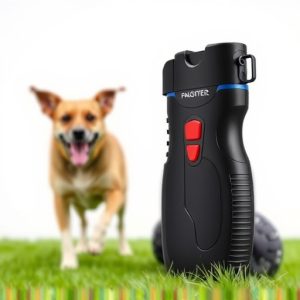Mastering Pepper Spray for Dog Attack Defense: State Laws and Safe Usage
Pepper spray designed specifically for dog attacks is a popular self-defense tool, using capsaicin t…….
Pepper spray designed specifically for dog attacks is a popular self-defense tool, using capsaicin to temporarily disrupt a dog's sensory perception. US laws vary widely, with some states allowing its use for self-defense while others restrict or prohibit it. Understanding these "Pepper Spray Dog Laws by State" is crucial for pet owners and dog walkers, as it directly impacts their ability to protect themselves during attacks. Safe deployment from 2-3 feet away targets the eyes, nose, and mouth for temporary disability without serious harm. Misuse can lead to legal repercussions, so consulting local regulations and decontamination procedures is essential.
“Learn how dog attack pepper spray can be a lifesaver in potentially deadly encounters. This comprehensive guide delves into the world of pepper spray as a defense mechanism against aggressive canines. We explore ‘Pepper Spray Dog Laws by State’, providing an essential overview for pet owners and outdoor enthusiasts alike. From understanding its functionality to mastering safe usage and legal aspects, this article equips you with crucial knowledge to navigate dog attack scenarios confidently.”
- Understanding Dog Attack Pepper Spray: What It Is and How It Works
- Pepper Spray Dog Laws by State: A Comprehensive Overview
- When and How to Use Dog Attack Pepper Spray Safely
- Safety Precautions and Legal Considerations for Pepper Spray in Dog Attacks
Understanding Dog Attack Pepper Spray: What It Is and How It Works
Pepper spray, specifically designed for dog attacks, is a non-lethal self-defense tool that has gained popularity among pet owners and individuals living in areas with aggressive canine populations. It’s more than just a spray; it’s a specialized defense mechanism tailored to disrupt a dog’s sensory perception without causing severe harm.
This type of pepper spray utilizes capsaicin, the same compound found in chili peppers, which irritates a dog’s eyes, nose, and throat when inhaled or in contact with its mucous membranes. This irritation temporarily blindsides the animal, giving the victim an opportunity to escape and seek safety. The effect is rapid yet temporary, ensuring it complies with Pepper Spray Dog Laws by State that prioritize non-lethal measures for canine control.
Pepper Spray Dog Laws by State: A Comprehensive Overview
In the United States, the usage of pepper spray as a deterrent against dog attacks varies significantly from state to state. Each state has its own set of regulations governing the possession, use, and distribution of pepper spray, with many specifically addressing its application in dealing with aggressive canines. These Pepper Spray Dog Laws by State are designed to balance public safety with animal welfare concerns.
For instance, some states allow individuals to carry pepper spray for self-defense against dogs, while others restrict its use solely to law enforcement or trained professionals. Still, other states have no specific laws regarding pepper spray for dog attacks, leaving the matter largely untied and up to local jurisdictions. Understanding these state-by-state variations is crucial for pet owners, dog walkers, and anyone who frequents areas with loose regulations, as it can significantly impact their ability to protect themselves in the event of a dog attack.
When and How to Use Dog Attack Pepper Spray Safely
When and How to Use Dog Attack Pepper Spray Safely
Dog attack pepper spray can be a life-saving tool, but it should be used cautiously and in accordance with local laws. Before considering carrying or using dog spray, familiarize yourself with Pepper Spray Dog Laws by State, as regulations vary significantly from one place to another. Some states require permits for certain types of pepper spray, while others have restrictions on where and how you can carry and use them. Always check the specific laws in your area to ensure compliance.
To use dog attack pepper spray safely, follow these steps: first, identify an approaching or attacking dog and assess the situation. If possible, try to deter the dog by yelling, making loud noises, or throwing objects on the ground. If the dog continues its aggressive behavior, quickly deploy the spray while maintaining a safe distance, typically around 2-3 feet away from the dog’s face. Aim for the eyes, nose, and mouth area as these are sensitive organs that can temporarily disable the dog without causing serious harm. After use, ensure you follow proper decontamination procedures to minimize any residual effects on yourself or others nearby.
Safety Precautions and Legal Considerations for Pepper Spray in Dog Attacks
When considering pepper spray as a defense against dog attacks, it’s crucial to understand safety precautions and legal considerations. First and foremost, ensure that you are familiar with your local and state laws regarding pepper spray use, including Pepper Spray Dog Laws by State, as regulations can vary significantly. Some states permit the use of pepper spray for self-defense, but restrictions apply when targeting animals. It’s important to check if there are any specific requirements or prohibitions related to dog attacks.
Safety is paramount; always store pepper spray out of reach of children and pets. During a dog encounter, aim the spray towards the animal’s face while maintaining a safe distance. Be prepared for potential legal repercussions if used inappropriately. Misuse could lead to fines or charges, especially if it provokes further aggression from the dog or causes harm to others nearby. Always consult with local law enforcement or legal experts to understand the specific rules and responsibilities in your region.
In conclusion, understanding pepper spray as a defense against dog attacks is crucial, especially considering varying state laws. By knowing the legal framework and safe usage guidelines outlined in this article, you can empower yourself to protect yourself and others during potential encounters. Always remember, safety precautions are paramount when using any form of self-defense, including pepper spray, in dog attack scenarios. Stay informed about your local Pepper Spray Dog Laws by State to ensure you’re prepared and within legal boundaries.


